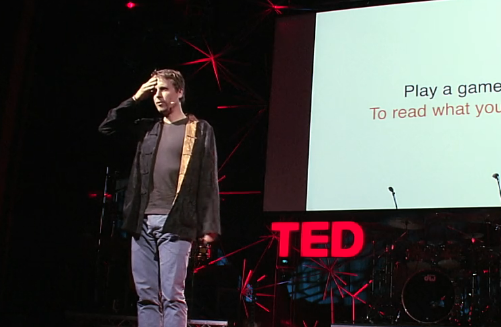So, this game is very simple. All you have to do is read what you see. Right? So, I'm going to count to you, so we don't all do it together.
好的,這個游戲非常簡單。你們只要把看到的念出來就好了,好嗎? 好,我接著會倒數,這樣我們就可以一起念出來了。
Okay, one, two, three. Can you read this? Amazing. What about this one? One, two, three. You are not reading this.
好,一,二,三!你能讀出這個嗎?厲害。那這個呢?一,二,三!你不在讀這個。
All right. One, two, three. If you were Portuguese, right? How about this one? One, two, three. What are you reading?
好吧。一,二,三!如果你是個葡萄牙人。對吧?那這個呢?一,二,三!
What are you reading? There are no words there. I said, read what you're seeing. Right?
你們在讀什么?你們在讀什么?那兒根本沒字。我剛說的是,把你們看到的念出來。對嗎?

It literally says, "Wat ar ou rea in?" Right? That's what you should have said. Right? Why is this?
它明明寫著,“爾門土賣十ム”對嗎?那才是你們本該念出來的。對吧?為什么會這樣?
It's because perception is grounded in our experience. Right?
這是因為感知基于我們的經驗。是吧?
The brain takes meaningless information and makes meaning out of it, which means we never see what's there,
大腦從不具意義的信息中提取出意義,也就是說我們從不去看那里到底是什么,
we never see information, we only ever see what was useful to see in the past. All right?
我們從不看信息。我們只看到過去曾見過的有用信息。懂了嗎?
Which means, when it comes to perception, we're all like this frog. Right? It's getting information. It's generating behavior that's useful.
也就是說,說到感知這回事兒,我們跟這只青蛙是一樣兒一樣兒的。對吧?它在汲取信息。它在產生行為。這就管用。











